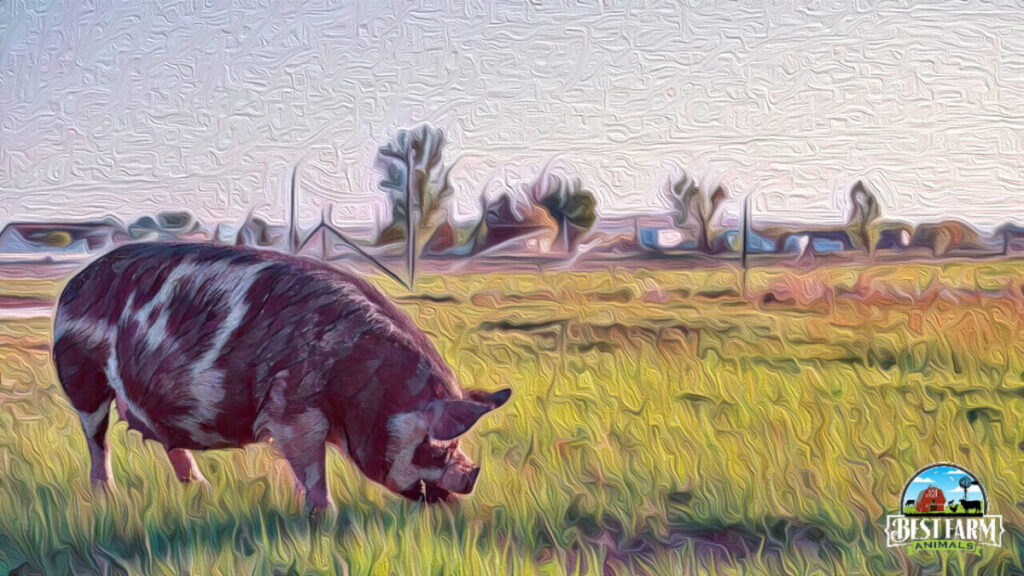Pigs have big appetites and effective digestive systems to cope with them. They are the opposite of picky eaters and will try almost any available food source, including tomatoes, potatoes, eggplants, and peppers.
Can pigs eat nightshade plants? Pigs can only eat nightshade plants in certain instances as many nightshades are poisonous. Some nightshades, such as tomatoes, potatoes, and peppers, can be eaten by pigs when the fruit is fully ripe.
These fruits and vegetables all belong to the nightshade family of plants and contain the alkaloid solanine. Solanine is a “glycoalkaloid poison” that protects the plant as it grows.
It is present in all parts of the plant at different stages of its development. This alkaloid affects the toxicity of the plants and may make certain parts unsuitable for consumption, even by a hungry pig.
We’ve been raising free-range pigs for years and have offered them everything from weeds to commercial grains and restaurant scraps.
Our pigs have eaten almost everything with the same enthusiasm and no sign of an adverse reaction. However, a pig shouldn’t eat some things, no matter how hungry.
Tomatoes as Part of the Pig’s Diet
Can Pigs Eat Tomatoes? Pigs can safely eat fully ripened tomatoes. Whether raw or cooked, ripe tomatoes are edible for all types of pigs, including hogs, potbellies, and mini pigs. The tomato plant’s unripe fruit, stem, and leaves contain solanine and are toxic to pigs. Even the calyx or green cap on top of the fruit includes solanine and is potentially poisonous.
There are thousands of varieties of tomatoes worldwide, all of which are safe for pigs to eat once they’re ripe and juicy.
Every other part of the plant, including the green fruits, contain solanine which is toxic to most animals, including pigs and humans.
Solanine is a natural pesticide that protects plants against insects and other pests. Its goal is to prevent anything from eating the plant before it reaches maturity.
Signs of solanine poisoning in pigs include:
- Diarrhea
- Weakness
- Shaking of the head
- Vomiting
If a pig consumes enough solanine, it will lapse into a coma and, most probably, die.
Fortunately, the amount of solanine in the green caps on top of the tomato is so tiny that they present little danger for large pigs. Nevertheless, you should remove as many as possible, especially when feeding tomatoes to mini pigs.
Tomatoes have many health benefits for pigs as they contain antioxidants, vitamins, and fiber.
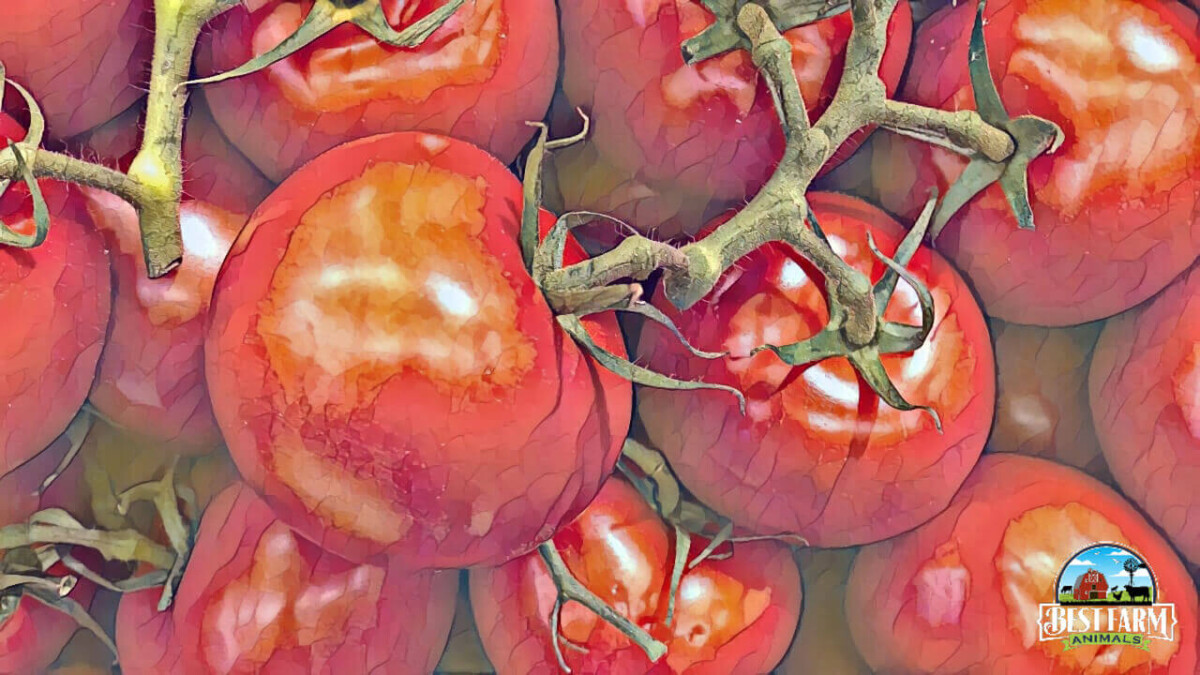
Raw Tomatoes are Better for Pigs than Cooked Ones
Tomatoes have a high nutritional value, whether offered cooked or raw. Cooking tomatoes of any variety decreases the amount of available vitamin C.
Cooking a tomato for even a couple of minutes can reduce its vitamin C content by as much as 10%.
Raw tomatoes have more health benefits and contain higher levels of vitamin C, which helps pigs to grow faster and “combat the negative effects of heat stress on feed intake.”
Potbellies and Mini Pigs can Eat Tomatoes
All types and breeds of pig can benefit from eating ripe tomatoes. Whether you’ve got a minipig who loves cherry tomatoes or a potbelly with an appetite for beefsteak tomatoes, it’s perfectly safe to treat it to its favorite food every once in a while.
To make the tomatoes safe for your pet pig to eat, ensure the fruit is completely ripe and remove all green parts of the plant, including the calyx.
It would be best if you also washed the tomatoes before offering them to your pig. Some tomatoes carry traces of pesticides and other chemicals that upset your pig’s digestive system.
While cherry tomatoes are small enough for mini pigs to eat whole, different varieties present a choking hazard and should be chopped up before feeding.
Only feed your pigs tomatoes as part of a balanced diet. Tomatoes are very acidic and could cause urinary infections if provided in large quantities.
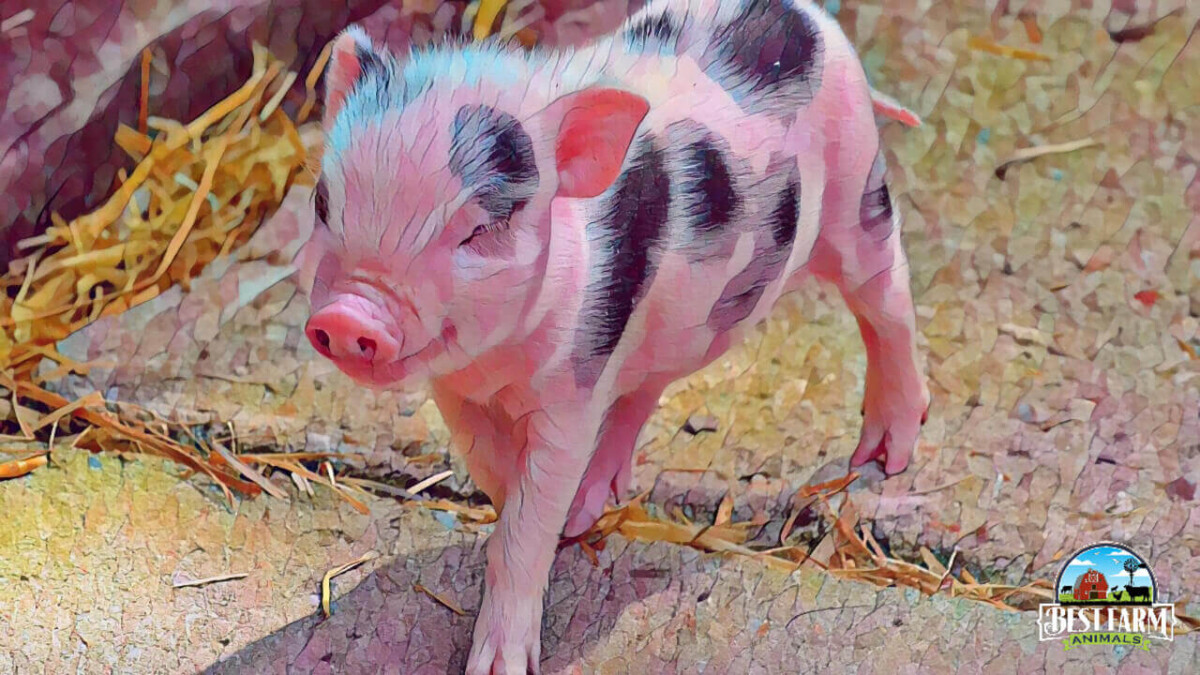
Tomato Sauce could be Dangerous for Pigs
Store-bought tomato sauce is a highly processed product with very few nutritional benefits for either pigs or humans.
It contains chemicals and preservatives that could be toxic to your pig and “hardly contains any protein, no fiber, no vitamins, and minerals.”
Homemade tomato sauce still benefits pigs because it’s processed differently and doesn’t contain the high fructose corn syrup used in commercial sauces.
Are Tomatoes Safe for Pigs?
Pigs can only safely eat the ripe fruits of the tomato plant. The stems, stalks, and leaves of all types of tomatoes contain solanine, which is poisonous to humans and farm animals. Even green tomatoes pose a danger as they have higher levels of solanine than the juicy red ones. Solanine attacks the cell membranes of the pig’s digestive system, causing gastrointestinal disorders.
The fruit’s stem needs removing before feeding as this also contains solanine. The ripe fruit, however, has numerous health benefits being high in vitamins C and A. Vitamin A helps maintain the pig’s notoriously poor eyesight. At the same time, Vitamin C boosts the immune system.
Pot-bellied pigs benefit from eating tomatoes just as much as a large Yorkshire or a 50 lb American Mini. Not only are they nutritional, but they also contain lots of water, so they will help your pig stay hydrated.
Are Bell Peppers Good for Pigs?
Pigs can eat bell peppers, including green, yellow, orange, and red bell peppers. But bell peppers don’t have many nutrients or calories to a pig’s diet. If pigs eat a lot of bell peppers, they may not gain weight as quickly. Other parts of the pepper plant (leaves, stem, roots) are poisonous to pigs and should never be fed to pigs. Spicy peppers will not harm pigs, but most pigs won’t eat them.
Meat pigs should be fed peppers only for variety (unless you have access to many free peppers). Bell peppers aren’t particularly nutritious, but they will add variety to your pig’s diet. Mini pigs and potbellied pigs should be fed peppers in moderation only.
Peppers are Good for Pigs, but are they Palatable?
Can pigs eat bell peppers? Pigs can eat bell peppers and get some nutritional benefits from them. Although bell peppers contain solanine, this poison is mainly found in the vine, leaves, and calyx. The fruit is safe for pigs to eat, even when green, as they only contain small quantities of solanine.
Although bell peppers are safe for pigs to eat, mine rarely show any interest in eating them raw. We grew many green bell peppers at one stage, and the pigs refused to eat them unless we cooked them first. The problem with doing that is it reduces the nutritional benefits of the fruit.
Raw peppers are high in antioxidants and low in starch. They contain lots of good nutrition, and all varieties are excellent sources of vitamin A, vitamin C, potassium, and fiber.
Red peppers are the most nutritious because they’ve spent the longest on the vine. They also contain “almost 11 times more beta-carotene and 1.5 times more vitamin C.”
Pigs convert beta-carotene into vitamin A, which is “essential for vision, reproduction, and tissue development.”
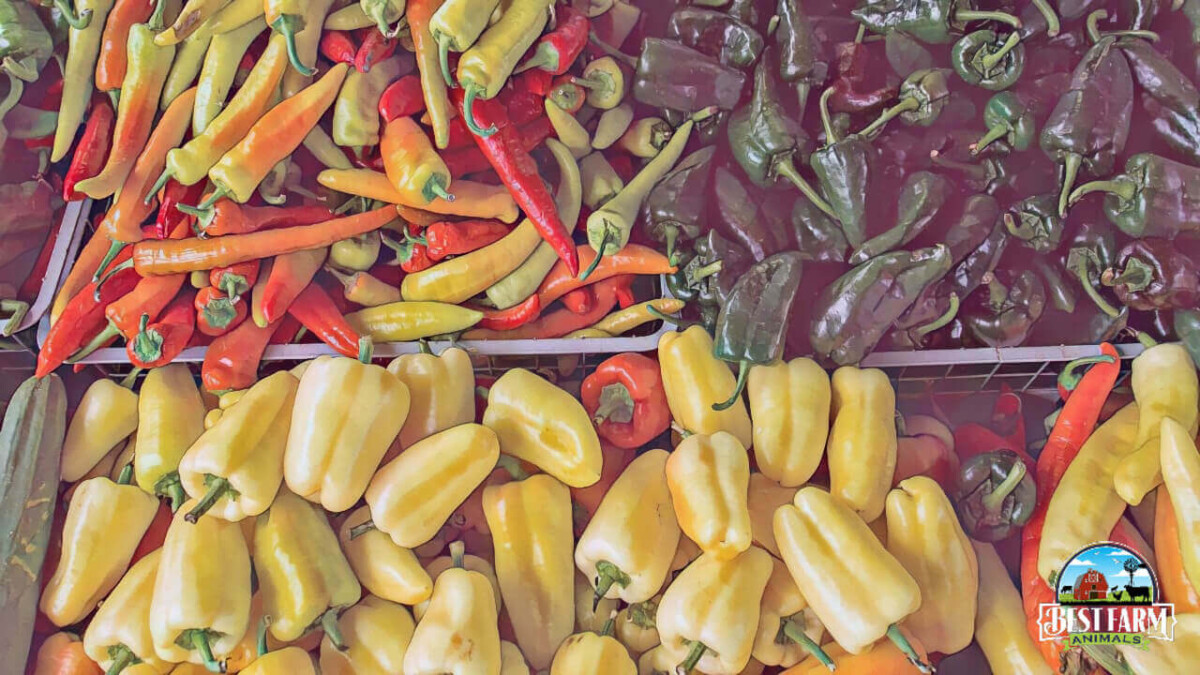
Pigs can Eat Jalapeños and Chili Peppers
Pigs can eat jalapenos and other hot peppers, but individual pigs may refuse to eat them. Spicy peppers will not harm pig, but if your pigs refuse to eat them, or food containing spicy peppers, it could negatively affect their nutritional intake. Peppers have some nutrients but are mostly calorie and nutrient void so pigs cannot eat hot peppers as a primary diet. Test whether your pigs will heat hot peppers in smaller quantities first and be cautious about mixing it into their food incase they refuse to eat the other food as well.
Pigs can eat jalapeños and other types of hot chilis in moderation. Too many can cause diarrhea and other digestive issues.
All types of hot chilis, including jalapeños, contain capsaicin. It’s this alkaloid that gives them their spicy flavor and many of their health benefits.
Jalapeños are high in nutrients but low in calories. They also contain healthy levels of vitamin C and fiber.
The Leaves of the Jalapeño Might be Safe for Pigs
Some people even recommend feeding jalapeño leaves to pigs, saying, “these types of leaves are not spicy and provide a great flavor to whatever meal you’re preparing for your pigs.”
As jalapeños belong to the nightshade family, one would expect their leaves to contain solanine which, as we’ve already established, is toxic to both pigs and humans. Nevertheless, jalapeño leaves are popular in both Filipino and Korean cuisine.
To err on the side of caution, I would recommend only feeding pigs cooked leaves from the chili plant and then only in moderation.
Pigs Can Develop a Taste for Spicy Foods
I’ve owned and bred over a hundred pigs, none of which showed any interest in eating hot or spicy foods. I’m not particularly keen on them, which is possibly why my pigs never developed a taste for them.
Some pigs enjoy spicy foods, but too much of it could still harm their digestive systems, so moderation is necessary. Limiting the chili pepper proportion of your pig’s diet to less than 1% of its entire food intake would be best.
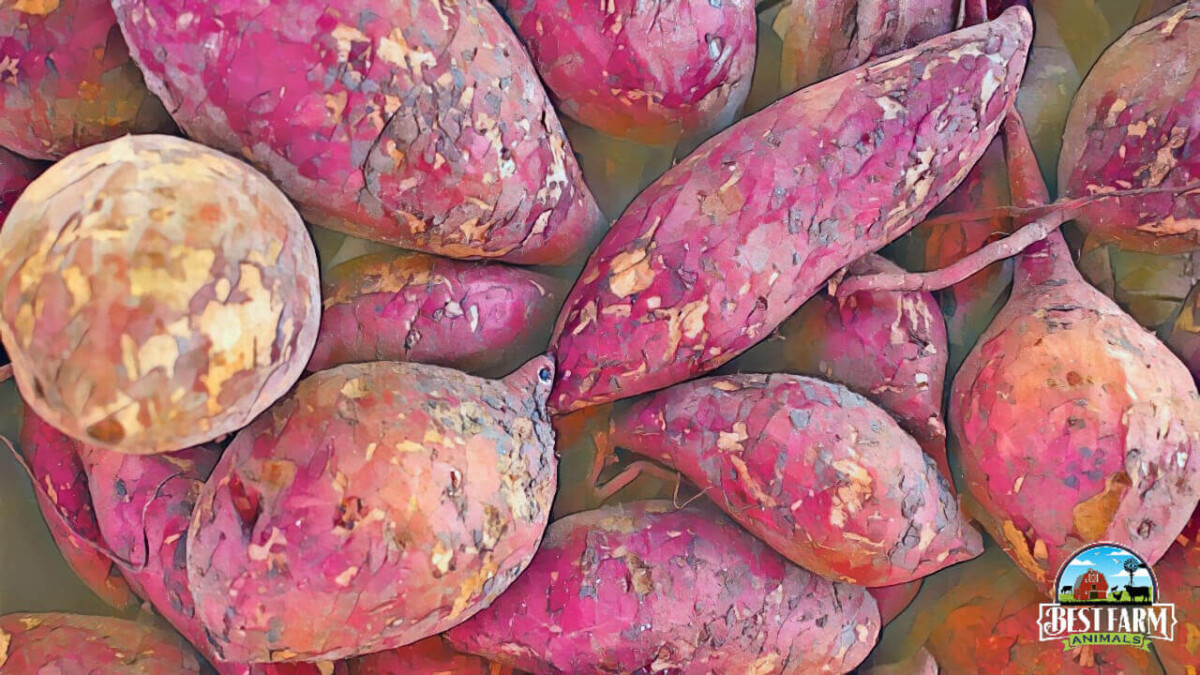
Can Pigs Eat Eggplants In Moderation?
Pigs benefit from eating eggplants due to their anti-inflammatory effects and high levels of antioxidants, potassium, magnesium, and vitamins. Like all nightshade family members, they contain traces of solanine that can cause diarrhea and other digestive issues, so you should only feed them in moderation.
Pigs can eat eggplants, but they should be given to them sparingly or not at all. Solanine and other alkaloids in eggplants and other nightshade plants can disrupt the digestive and neurological systems. When fed in large quantities, the alkaloids in nightshade veggies can cause diarrhea, paralysis and even death in pigs.
Alkaloids found in eggplants can also adversely affect joints and bone health because they interfere with calcium absorption. However, eggplants are high in potassium, magnesium, and vitamins B1 and B6, all of which are essential for pig health. Flavonoids in eggplants help lower cholesterol levels, promoting cardiovascular health in pigs prone to heart-problems.
The anti-inflammatory qualities of eggplants can help ease your pet’s pain if they are experiencing joint problems or inflammation. If you must feed eggplant to your pigs, make sure to steam, boil, cook, or ake the vegetables. Cooking reduces alkaloids by 40-50%. But still, make sure you give eggplants to your pigs occasionally and in very small quantities.
Cooking reduces the dangerous alkaloids in eggplant by 40 to 50%, making cooked eggplant much safer for pigs than raw vegetables.
Conclusion
Even though they contain solanine, many nightshade family members are safe for pigs to eat, provided you prepare them properly.
Tomatoes, potatoes, bell peppers, jalapeños, sweet potatoes, and eggplant all have nutritional benefits for pigs when fed in moderation.
These vegetables should never form the main bulk of your pig’s diet but can be used to supplement a commercial grain-based feed, especially for growing meat pigs. Mini pigs and potbellies can also get nutritional benefits from these vegetables.
As all these vegetables, except for sweet potatoes, contain some solanine, caution is required. As a general rule of thumb, remove all green parts of the plant before feeding, chop and cook the vegetable as needed, and limit your pig’s consumption to just 25% of their daily diet.
In other words, if you’re feeding a 150 lb mini pig 6 lb of feed per day, this should include no more than 1.5 lb of peppers, tomatoes, or any of the other vegetables discussed in this article.
For more tips on feeding pigs vegetables, check out this article on Healthy Vegetables For Pigs: Potbellied, Mini, All Pigs.
My Most Used Pig Supplies
This list contains affiliate products. Affiliate products do not cost more but helps to support BestFarmAnimals and our goal to provide farm animal owners with accurate and helpful information.
Purina Pig Chow will last well (or Mazuri is popular, but I haven’t tried it), and the stainless steel non-skid bowls that will help keep the mess down.
A pig blanket to keep her warm. This one also has bright colors and helps to provide rooting without the destruction.
Pig Harness for walking and handling your pig. There are a lot to choose from, but this one is pretty easy to use. If you want one that has a separate leash, this looks like a good one.
A large crate for keeping her safe in your house at night and when you leave the house. This is essential. You’ll also want a litterbox, and I like mine with a lid for nighttime. Pine shavings are best, and you may be able to find them in larger quantities locally.
When you have accidents, Odoban will help eliminate odors. When you are potty training, these floor pads work great for keeping your house clean while training her to go in certain places.
You’ll also want an outdoor house to keep her warm when she gets outside time, an essential part of her development.
Dewormer- Ivermectin is the primary dewormer I use, although I do rotate with a non-ivermect ingredient once so that the worms don’t get immune to it.

